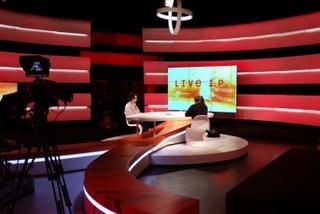Live IP: The Live Debate
BRUSSELS, BELGIUM--Audiences were able to see the workings of a complete IP-based ecosystem recently, when a “Live IP” debate was broadcast online directly from the VRT Live IP Studio, produced entirely using IP technology.

The LiveIP Project is a collaboration between Belgian broadcaster VRT, the EBU and partners including Grass Valley, Nevion, EVS and Lawo. Discussing the project, and offering their perspectives on the transition to IP production were Brigitta Nickelsen, director of business development at Radio Bremen, Mick De Valck, director of technology and operations of VRT, Charlie Cope, technical executive at BBC Sport, and Hans Hoffman, head of media fundamentals and production technologies at EBU.
‘ALMOST NO GLUEWARE’
The venture uses existing open standards SMPTE 2022-6, AES67 and PTP, and has also proposed a number of basic principles including the sharing of resources, optimizing investment, creating efficient remote production, and automation.
As part of the webinar Michel De Wolf, founder of Belgium-based creative engineering company DWESAM, reported live from the IP control room, where audiences could see how technology including Grass Valley switchers, and intercom tech from Trilogy, is utilized. The facility features “almost no glueware” explained De Wolfe, and no SDI router. “This is fantastic,” he continued, “all this is supplied to us by a fully managed network, from a Nevion product called VideoIPath, a service and network management system that provides connection management, service assurance and network inventory capabilities for service providers and broadcasters. The move to IP is only one step in a greater evolution, said De Wolfe, which will also involve an evolution in data centers, moving dedicated equipment to software, and increased virtualization.
So what kind of benefits will such IP-based systems bring on a practical level? The BBC has been working on remote operations for major events since 2008, and the BBC’s Charlie Cope described major events like the Olympics as points of “dramatic change.”
There are issues of scalability around major events, Cope continued, resulting in “peak load around our facilities;” if you have the flexibility to move facilities, “there’s benefit in there.”
Get the TV Tech Newsletter
The professional video industry's #1 source for news, trends and product and tech information. Sign up below.
TRIAL REMOTE PRODUCTION
On Jan. 15, 2016, VRT accomplished a trial remote production of a live musical concert using IP and open standards across the whole production chain. The concert venue in Brussels was connected to the LiveIP control room at VRT at a different location in the city, by a single 10km optical fibre cable, carrying an IP network.
“The combination of CWDM technology and IP for broadcast allows us to transport approximatively 25Gbps for all four IP cameras, 10 microphones, intercom, telepresence and controls over one optical fibre cable, without any delay,” said Karel DeBondt, project manager at VRT. “This made our remote production so easy and transparent that you immediately forget that your program is being produced 10km away from the stage upon which it takes place!”
For the IP project to evolve and succeed, a level of know-how is essential, the webcast participants agreed. However, Hoffman argued that engineers who have a solid skillset of technology domains, including both audiovisual and IT, are “a rare breed in the market.” These skillsets can be found in companies based on the west coast of the US, he continued, but are lacking in Europe. If such skills can be found here, they are costly. This is something universities need to focus on, added Hoffman, as IP is not an easy technology, but a cutting-edge technology, which we need to be able “dive into the details” of.
Nickelsen, however, believes that at the rate the technology is developing there is not time for universities to train people. She shared her “dream” for a media system in Europe in which technology will enable us to bring good value content wherever our audiences are. We need to be provided with the best production equipment, she continued, to distribute over every channel and to put as much money as possible into content production. This, she said, “will guarantee our existence.”
LiveIP presents an opportunity to learn in a real-life scenario, and events such as the recent webcast provide debate and thought leadership to the industry through the IP transition.
Details of further projects can be found on the LiveIP website.
This article first appeared in TVB Europe.
